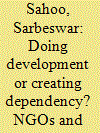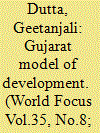|
|
|
Sort Order |
|
|
|
Items / Page
|
|
|
|
|
|
|
| Srl | Item |
| 1 |
ID:
121115


|
|
|
|
|
| Publication |
2013.
|
| Summary/Abstract |
This paper examines the role of non-government organisations (NGOs) and the implications for democratisation in India. By analysing one such organisation, this paper argues that NGOs do not always contribute positively to the democratisation process. It shows how Seva Mandir, an NGO working in the tribal areas of Rajasthan, has adopted a purely technocratic and apolitical service delivery approach and promoted a neo-liberal model of development. The unintended consequence of promoting this model has been the growth of a culture of 'organised dependency' at the grass-roots level, which has adversely affected the larger objectives of empowerment and democratisation.
|
|
|
|
|
|
|
|
|
|
|
|
|
|
|
|
| 2 |
ID:
133444


|
|
|
|
|
| Publication |
2014.
|
| Summary/Abstract |
The Gujarat model of development, also known as Modinomics or Modi Model, is not about Gujarat's growth alone but development too. Its vibrant industries, perceptible improvement in social sectors, is a story of education, health, water, electricity and roads. It is a story of how the benefits have trickled down and how deprived segments have been streamlined. The Gujarat model, so to speak, has implications for other states too, since it is about governance, efficient public expenditure, decentralization and participatory planning.
|
|
|
|
|
|
|
|
|
|
|
|
|
|
|
|
| 3 |
ID:
119143


|
|
|
|
|
| Publication |
2013.
|
| Summary/Abstract |
Few Indian regions evoke political, economic, and cultural marginalisation as much as North-East India. Solutions to its political instability often assume that, provided the vicious circle of under-development and violence can be broken, the region will eventually build a stable relationship with the Indian nation-state. This understanding in turns rests on a long intellectual genealogy that associates development with the state and the nation. By examining development schemes in the North-East Frontier Agency (NEFA, today's Arunachal Pradesh) in the 1950-1960s, a hitherto scarcely administered region where these were the primary mode of state-building, this article cautions against the tendency to see the Indian state's developmental ambitions as an instrument of nation-building. Instead it argues that, in North-East India at least, state-making and nation-building have not historically gone together, and that developmentalism played an important part in this rupture. On the ground, tribal development did little for NEFA's integration into the Indian nation. In fact, state-making processes resulted in the disintegration of the links that had tied NEFA with its regional hinterland in India. In the process, some of the seeds of tensions plaguing today's North-East India were planted.
|
|
|
|
|
|
|
|
|
|
|
|
|
|
|
|
|
|
|
|
|